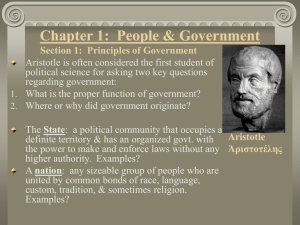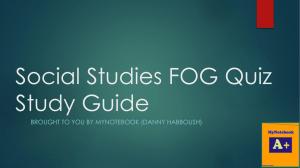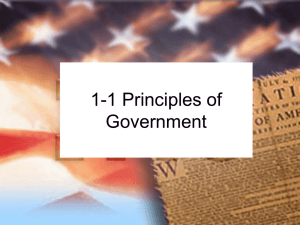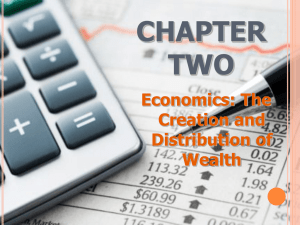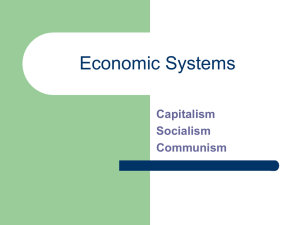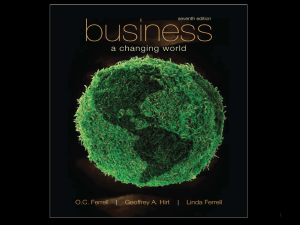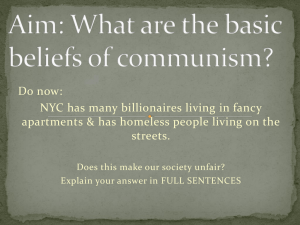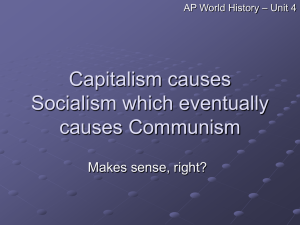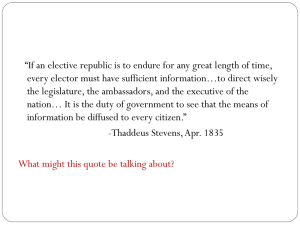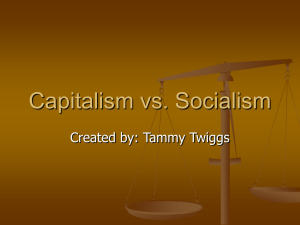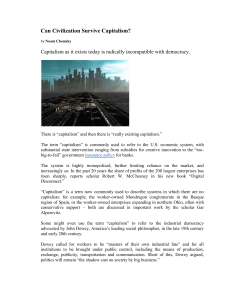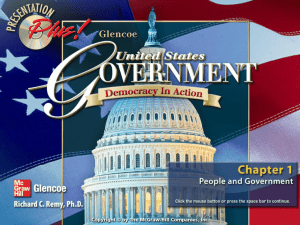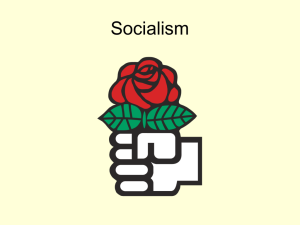Principles of Government Chapter One
advertisement
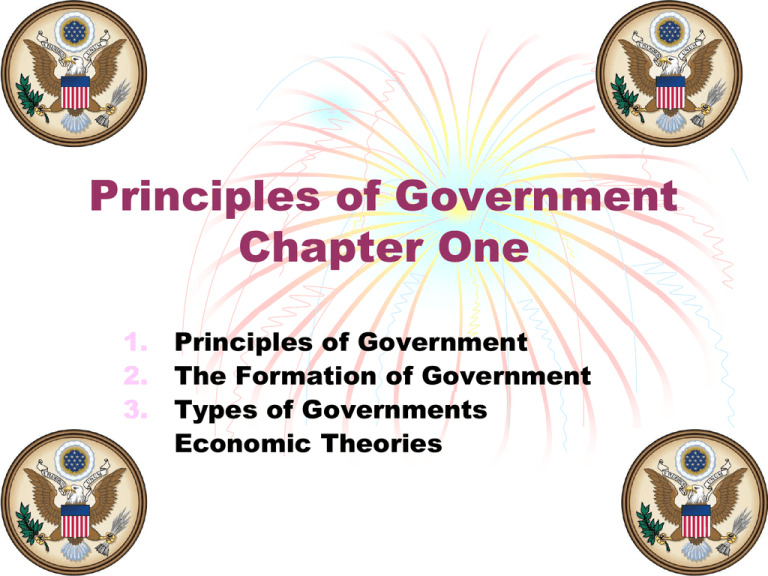
Principles of Government Chapter One 1. 2. 3. 4. Principles of Government The Formation of Government Types of Governments Economic Theories What is a STATE (A political community in a precise territory) • Population: a group of people who share a consensus or agreement about basic beliefs and values • Territory: Established boundaries. • Sovereignty: The State has supreme and absolute authority within its boundaries. • Government: An institution that can maintain social order; provides public service and enforces decisions that are binding on all its residents Origins of the State • Evolutionary Theory: The state evolved out of the family structure • Force Theory: Those with the most force make the rules. People agree to follow out of fear • Divine Right Theory: Rulers claim they are chosen by GOD/GODS. • Social Contract Theory: To create a government, a social contract was made between the ruler and the ruled. (HOBBES and LOCKE) HOBBES and LOCKE • Thomas Hobbes • “State of Nature” Man lives in a state of war. People will agree to follow the rules as long as they are protected by their leader • John Locke • “Social Contract” People will surrender their will to the government if their needs are met. • “Natural Rights” Life, Liberty and Property • No right to revolt if rights are protected • But if needs are not met, they had the right/responsibility to rebel and fight for a government that would protect them Purposes of Government • • • • Maintain Social Order Provide Public Services Provide Security and Defense Provide for the Economy • To fulfill these functions, government makes rules that everyone must follow and have the authority to punish those who do not follow them Formation of Governments • Unitary System: All the power is given to a central government • Federal System: Divides powers of government between national and state/local government. Each has sovereignty over certain areas • Confederacy • Federalism Constitutions and Gov’t (a plan that provide the rules for government) • 1) Sets out ideals that the people bound by the constitution believe in and share • 2) Establishes the basic structure of government and defines the government’s powers and duties • 3) Provides the supreme law for the country Constitutional Government • All governments have some sort of constitution (either written or unwritten) • Some chose to follow their constitution very closely • Some choose to empower their governments very differently than our Constitution Constitutions • Incomplete Guides: Intentionally vague • Can’t foresee all things • Doesn’t reflect how government actually works • Statement of Goals: Preamble • Framework for Government: for the government (structure/function) • Highest Law: plan Politics and Government • Seeking Government Benefits • People participate in politics because they believe they can influence lives in many ways • People participate in politics to influence how money is spent • Importance of Politics • Politics provides a peaceful way to people to compete for government favor • Special Interests • Groups of people who band together to try to influence how/what government is doing What is the same? What is the difference? Constitutional Government Government with a constitution Governing in a Complex World • Inequalities Among States • Industrialized Nations • Developing Nations • Growing Interdependence • Nations today depend on each other, especially economically and politically • International Organizations • Groups operate on a worldwide basis • • • • • National Liberation Organizations Terrorist Organization Multination Corporations Organizations of States around the world Nongovernmental Organizations (NGO’s) Types of Government (p. 18-21) Use your book to fill in information in the chart below: Type of Government (red headings) Features “Marooned” • You have been marooned on an island out in the ocean. You need to set up a society and adopt rules and regulations 1) 2) 3) 4) Develop a plan of how your government will distribute jobs, build shelters, and gather food How will you provide medical care and/or education Will there be police/military What will punishments be if they go against the rules Types of Governments • Autocracy (one person has all the authority and power) • Monarchy, Dictatorship • England/Netherlands, North Korea • Oligarchy (a small group holds power) • China (Communist party • Iran (Theocracy) • Democracy (rule is by the people, either through representatives or directly) • Direct – each person votes on all issues – Town hall meetings • Republic – representative government – Most modern democracies (US, Japan, England) Characteristics of Democracy • Individual Liberty • All have rights (not absolute) the government cannot take away without going through ‘due process’ • Majority Rule/Minority Rights • • All decisions by the government are made by vote (majority rules) Rights are protected and not subject to a vote • • • • Each vote counts the same Candidates have the right to express their opinions freely Citizens are free to help the candidate of their choice Legal requirements to vote are minimal (age, citizen) • Political parties are groups of people with broad common interests who organize to nominate candidates, win elections and then conduct government and determine public policy Focus voters’ attention on the issues by debating them publicly Serve as “loyal opposition” by critcizing policies and actions of the party in power • Free Elections • Competing Political Parties • • Essential Elements for a Democracy • Citizen Participation • Citizens who inform themselves and actively participate in politics (campaigns and votes) • A Favorable Economy • • A large middle class (wealth broadly accessed) Free Enterprise/Market Economy • Most of the citizens are educated, able to access education • A society with strong organizations that operate outside of the government • Widespread Education • A Strong Civil Society • A Social Consensus • Society shares common democratic ideas • (Individual Liberties, Rule by Law, Limited Government Economic Theories What and how much to produce? How should goods and services be produced? Who gets the goods and services? • • • • Capitalism Socialism Communism Mixed Economies Economic Systems • Capitalism • An economic system providing free choice and individual incentive for workers, investors, consumers, and business enterprises • Socialism • An economic system in which the government owns the basic means of production, distributes the products and wages, and provides social services such as health care and welfare • Communism • An economic system in which the government controls ALL major economic decisions Economic System Who Owns the Resources Who Makes Economic Decisions Capitalism Individuals and businesses Individuals and businesses Socialism People, through their government Representatives of the people Mixed Economy Individuals, businesses, and government Individuals, businesses, and government Communism (Command Economy) Government Government Capitalism • Free Market: the government places no limits on the freedom of buyers and sellers to make economic decisions • Laissez-Faire: the market works with an “invisible hand” guiding economic choices for the best possible results. The actions of the buyers and sellers determine what is produced and bought (and the price), not the government • Competition: Plays a key role in this type of economy because sellers compete over resources to produce goods/services and buyers compete over limited products to buy what they want and need. Sellers also compete with each other to sell their product to the consumer Capitalism (continued) • Free Market in America • • • • Pure Capitalism does not exist US Economy one of the most capitalistic in the world Some government regulation, but market still primarily Since the Great Depression, the US has operated with more government regulation of its economy • Mixed Economy • When a country “mixes” elements of two economic systems – like Capitalism and Socialism • The US today is a mixed economy • Opponents: believe capitalism allows the wealth to be concentrated in the hands of very few Socialism An economic system in which the government owns the pasic means of production, determines the use of resources, distributes products and wages • Social Reformers believe that with so much productive capacity, NO ONE SHOULD HAVE TO SUFFER OR STARVE • The government should direct the economy to distribute goods and wealth more equally. • Opponents of socialism say that it stifles individual initiative and that higher tax rates hinder economic growth • Most European nations have a form of socialism Communism (Karl Marx) • Capitalists are the ruling class and they control most of the resources • Proletariat is the working class. They do not receive the full value of the labor • History is filled with struggles between the classes • Communism was a system in which there is only one class, the working class • All property/means of production would be held in common for the common good • Command Economy is one where the decision of what to produce, who gets what resources, etc are made by a central government unit Chapter One Vocabulary • • • • • Autocracy Capitalism Command Economy Communism Constitution * * * * * Democracy Free Market Republic Sovereignty State Quick Review • • • • • • • • • • 4 Characteristics of a State 4 Origins of State Hobbes/Locke 4 Purposes of Government Unitary/Federal Forms of Government Purpose of a Constitution 3 Types of Government 4 Characteristics of a Democracy 3 Economic Systems 5 Essentials for a Democracy to Thrive Chapter One Essays (Answer 2 of the 3 essays FULLY) 1) There are three types of economic systems. Explain each. • • • What are they How do they operate/How do governments enforce their decisions How are they different/alike 2) There are four characteristics of a democracy. • • Identify the four characteristics Explain why they are important/vital to a democracy 3) The United States is an example of a Social Contract theory of government. • • • Identify the two people who founded this philosophy Explain the statement in essay 3 Give an example in America of a social contract
